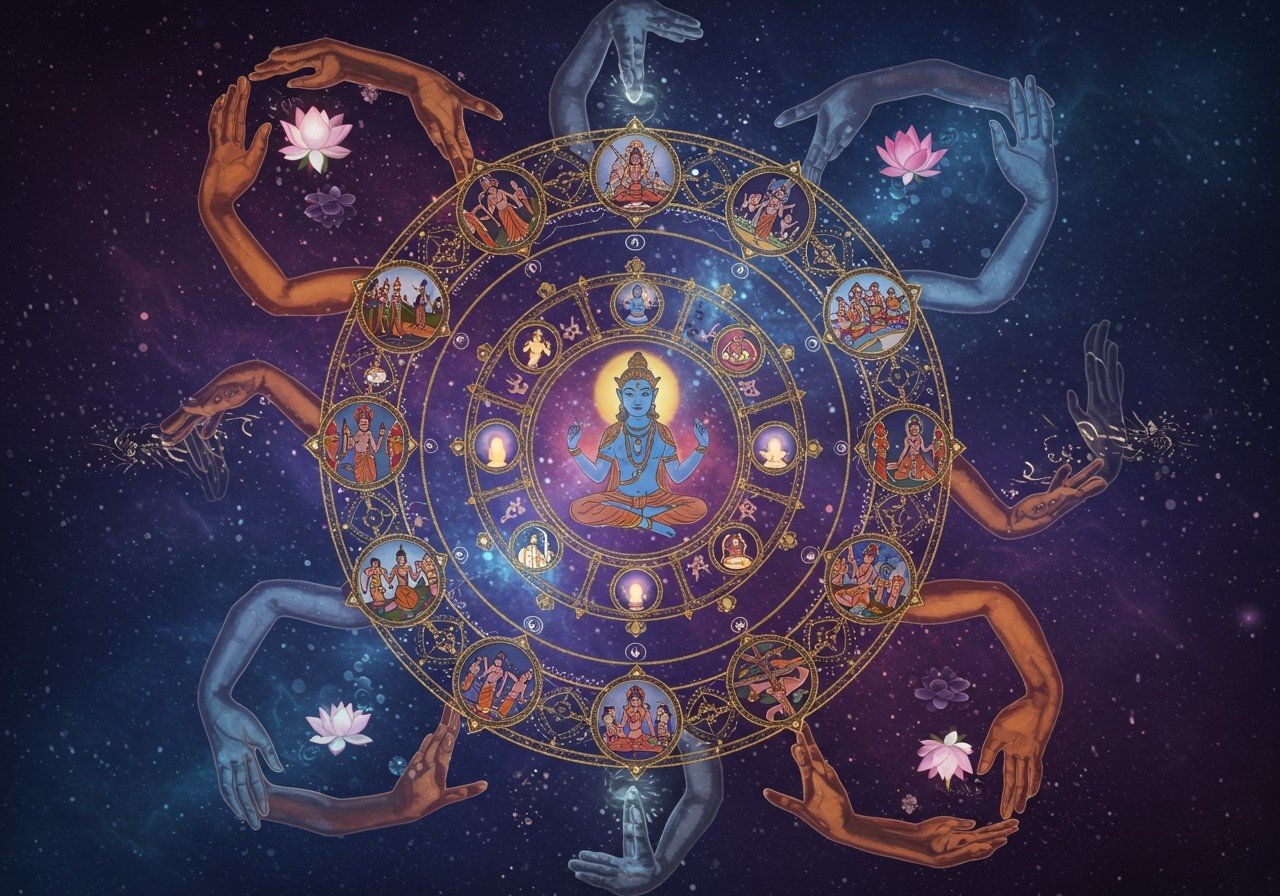
Karma, a core principle in Indian religions and philosophies, is often misinterpreted. This article clarifies karma’s origins, meaning, and significance in Indian thought. We’ll explore the laws, theories, and principles of karma that have shaped the spiritual lives of countless individuals.
The Origins of Karma
Historical Roots
The concept of karma has deep roots in ancient Indian texts, notably the Vedas (circa 1500-500 BCE) and Upanishads (circa 800-500 BCE). These scriptures laid the groundwork for understanding cosmic order and the interconnectedness of actions and consequences. Over time, karma became integral to Hinduism, Buddhism, Jainism, and Sikhism, profoundly influencing Indian culture and spirituality.
Key Figures and Karma
Lord Krishna in the Bhagavad Gita (circa 5th-2nd century BCE) and the Buddha (circa 6th-4th century BCE) are pivotal figures associated with karma. Krishna’s teachings on karma yoga emphasize selfless action, while the Buddha’s focus on mindfulness and the Four Noble Truths provides a path to liberation from suffering through right action. Explore resources on these figures and their teachings on Karma in Hinduism and Hindu Gods and Goddesses.
Defining Karma
Karma, derived from the Sanskrit word “kri” (to act), is the principle of cause and effect. It suggests that every action, thought, and intention has consequences that can manifest in this life or future lives. This principle plays a crucial role in the cycle of birth and rebirth (samsara). Dharma, righteous conduct, is closely linked to karma, guiding individuals towards actions that create positive karmic outcomes. Ultimately, the goal is moksha, liberation from the cycle of samsara, achieved through resolving karmic debts.
The Law of Karma
The law of karma operates on the principle of cause and effect. Every action, whether physical, mental, or verbal, generates consequences. These consequences shape not only our present experiences but also influence future lives. The intention behind an action significantly impacts the nature of the karma generated. Actions motivated by selfish desires or ill will create negative karma, while actions rooted in compassion and selflessness generate positive karma. This accumulation of karmic debt or merit influences an individual’s life journey.
Karma in Different Indian Philosophies
While the concept of karma is shared across various Indian philosophies, each tradition offers unique interpretations. Hinduism emphasizes dharma and moksha, advocating for actions aligned with one’s duty and the pursuit of liberation. Buddhism focuses on mindful actions and overcoming suffering, emphasizing the importance of the present moment and the cessation of craving. Jainism stresses non-violence (ahimsa) and purification of the soul, advocating for a life of minimal impact on other beings. Explore these traditions further in our articles on Vedas: Ancient Wisdom and Hinduism: A Celebration of Diversity.
Practical Implications of Karma
Understanding karma can profoundly influence daily life. It encourages mindful actions, ethical behavior, and a focus on positive intentions. Karma is seen as a catalyst for personal growth and spiritual development. Self-reflection, meditation, forgiveness, and compassion are practices that can help manage karma and promote spiritual progress. Discover tools and resources for spiritual practices on Poojn.in, including incense sticks and sindoor containers.
Debunking Misconceptions about Karma
Karma is often misunderstood as fate or predestination. However, karma emphasizes personal responsibility, highlighting the power of choice in shaping one’s future. It is not a system of instant retribution but rather a continuous process of cause and effect that unfolds over time. Our actions, thoughts, and intentions hold the key to shaping our karmic destiny.
Conclusion: Embracing Karma in Everyday Life
Karma is not merely a philosophical concept but a way of life. By understanding and embracing its principles, we can strive for a more meaningful and fulfilling existence. Mindful actions, ethical behavior, and compassion are key to cultivating positive karma. As we navigate life’s journey, let karma be a guiding principle, leading us toward spiritual growth and liberation. Poojn.in offers a wide selection of spiritual products, from Laddu Gopal statues to incense, to support your spiritual journey.


